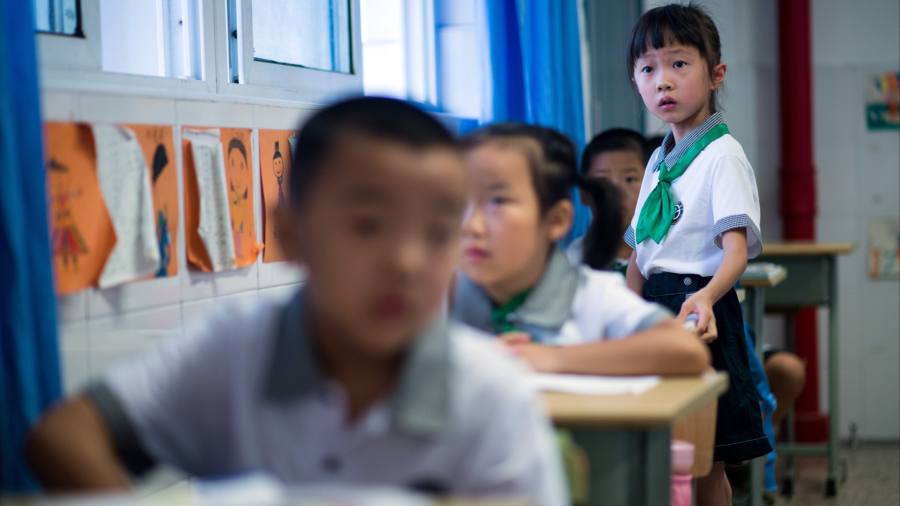Receive free Chinese society updates
We’ll send you a myFT Daily Digest email rounding up the latest Chinese society news every morning.
With a contact book full of teachers and parents desperate to give their children the best opportunities, tutoring broker Elaine is doing a roaring trade, even in the face of repeated closures, fines and a persistent government crackdown.
Two years after the government first squeezed for-profit education companies, business is “growing very quickly”, said Elaine, who asked that her Chinese name not be used. “We have been reported several times. The authorities were tipped off, but the punishment was very light.
“More and more parents realise that after-class training and tutoring still exist, and that their children will fall behind if they don’t use it,” added the broker, who is based in the southern Chinese city of Shenzhen.
Xi Jinping’s government has sought to reduce the advantage of money in a fiercely competitive educational environment where top university degrees can be crucial to enter high-paying industries.
The so-called double reduction policy in China has aimed since 2021 to limit homework and after-school tutoring and makes it illegal to teach core curriculum subjects, such as Chinese, English and mathematics, outside of school for profit. In cities such as Shanghai, Shenzhen and Beijing, however, parents find a way.
The country’s for-profit tutoring industry, once anchored by US-listed Chinese corporations that employed hundreds of thousands of people and commanded valuations in the tens of billions of dollars, has splintered into a black market where agents and tutors privately liaise with parents.
“For middle-class people, they’ve found solutions, very local solutions that are invisible to anyone from the outside,” said Julian Fisher, co-founder of Venture Education, a Beijing-based market intelligence consultancy. “It’s impossible to say how widespread it is because no one talks about it any more.”
Severe pressures remain in place given children may have to shift to a vocational path based on middle-school exam results. “Imagine the fear of God that has been put through a lot of families . . . who have spent the last 20-30 years escaping life in the factories or fields,” Fisher said.
The government this year has already published multiple notices, including a State Council decree in March, that it will “continue to implement” the policy, but on the ground in major cities, there is little sense that the tutoring services it seeks to prohibit are difficult to access.
“Recently, I’ve had the feeling things have just returned to how they were before,” said one parent in Shanghai whose child is in high school. “But the institutions are limited by regulations, so they aren’t around any more.”
The government, the parent said, cracked down on tutoring “in the name of fairness”, but as the underground market has flourished, it has “gradually turned a blind eye to it”.
Tutoring services are nowadays often co-ordinated through groups on WeChat, China’s main social media platform, while tutors often teach students directly in their homes or work in centres that may disguise their teaching content in the event of an inspection.
“The demand is just crazy,” said one English-language teacher in Shanghai, adding that he earns about Rmb400 ($56) an hour from tutoring and that the practice “usually just kind of spreads” whenever he visits a student at home in a residential compound.
“If someone sees you in a lift, they’re like, ‘What are you doing here?’ You say ‘tutoring’ and it’s like, boom, ‘What are you doing next week?’”
The teacher also works in a centre where any potential inspector “could clear as day see here’s a classroom” because “all our visas are up on the wall”.
“That’s something I‘ve always found a bit strange. It’s illegal, but they’re definitely trying to operate legally,” he said. “I don’t really go digging for questions.”
The owner of one tutoring institution in the wealthy eastern city of Hangzhou said teachers sometimes rented out different training venues to avoid detection. Online classes were also popular.
Such is the secrecy surrounding tutoring that Fisher cited the example of a high-powered Beijing parent who dropped their child off in a different place each time. The youngster was then taken to a mystery tutoring location that neither of them had been told about.
Like the practice it seeks to counter, popular attitudes towards the policy itself are difficult to gauge. Fisher suggested that parents would agree the policy was a “good thing” because the previous situation was “not sustainable”. He has seen more children playing after school by his Beijing compound since it was introduced.
The 2021 policy resonated internationally because of its role in wiping out part of the operations of major companies, highlighting the fragility of the private sector in an environment of high centralised control.
For Xi’s government, the optics of the crackdown were designed to appeal instead to a domestic audience, but when it comes to enforcement, it is sometimes unclear where the government’s heart really lies.
In Shenzhen, Elaine is relaxed about occasional inspections from the authorities. “They have kids,” she said. “After they visit us for an inspection, they sometimes come back later to try to find a tutor.”
Read the full article here




